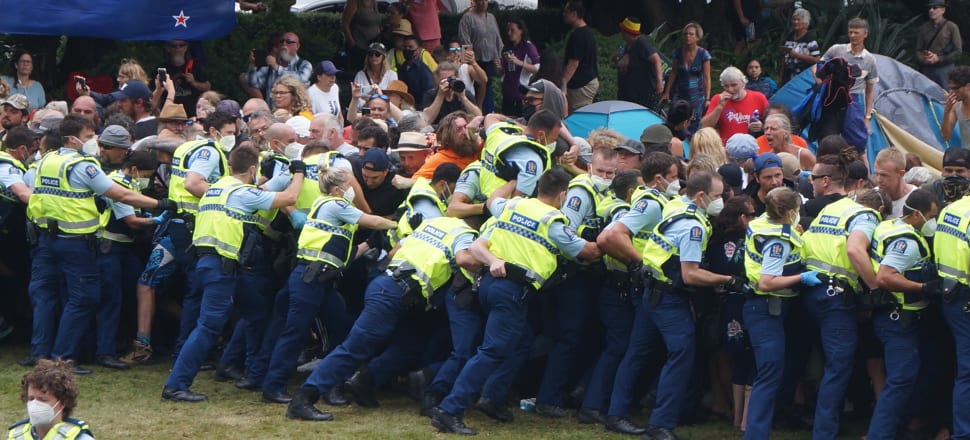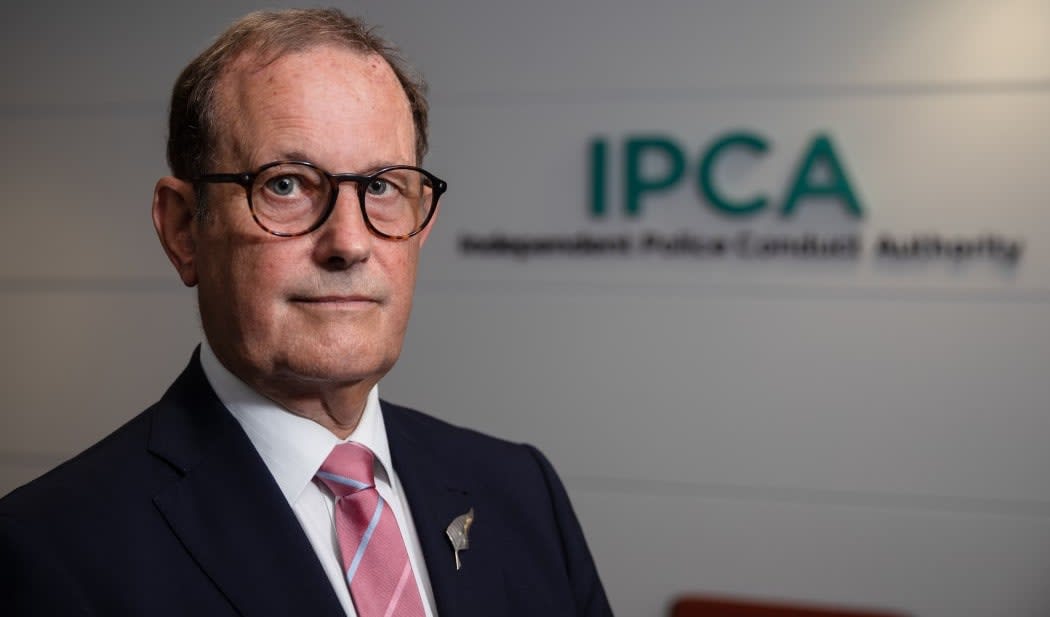
The outgoing chair of the Independent Police Conduct Authority leaves the role unconvinced police are prepared to prosecute one of their own. He speaks to Emma Hatton about the future of the authority and what he wants his successor to know.
Judge Colin Doherty has finished at the Independent Police Conduct Authority (IPCA), eight months after his five-year term officially ended.
He said the time had come for a serious discussion about who should be prosecuting police when they were wrong.
READ MORE:
* New police watchdog chair a ‘missed opportunity’
* ‘It looks like everyone is leaving’: How police failed at Parliament
“The issue really is that over the period I've been here, I've seen from time to time a reluctance by police to prosecute police officers where if it had been an ordinary member of the public, I've got no doubt that a prosecution would have been made.”
Whether those powers should lie with the IPCA is something a review, which he has long advocated for, would consider.
“The IPCA might not be the appropriate people to do the prosecution, but it might be able to recommend to for example Crown Law that a prosecution be taken.”

Newsroom reported last year most investigations initiated by the IPCA ended with no consequences or an opaque "employment investigation" for police officers involved in misconduct.
At the time Doherty wrote to parliament's select committee expressing frustration police may not be striking the right balance between dealing with conduct issues effectively and being a good employer that protects and supports frontline staff.
Doherty said any change to prosecutorial powers would shift the relationship dynamic between the two entities.
“While we're independent, it's true and effective that the IPCA really relies to an extent on the cooperation of police to provide information in a timely way to make sure we have a relationship, which means we can talk to each other.
“It's not a collaborative relationship, but it is certainly at an operation level, a cooperative one.
“It would also probably mean that there would need to be other changes, because you are probably aware that currently, the IPCA Act provides that any information given by officers to the authority can't be used to prosecute. So it would provide quite a different approach and would mean the relationship was totally different.”
A change in prosecutorial powers would invariably not be without its difficulties.
“My point is that I think we've got to the stage that there needs to be the discussion about it.”
Doherty said a lack of police prosecutions under the current system appeared to be tied up with the letter of the law.
“It's really tied up in a policy issue really … there was a case, Wallace and the Attorney General, which related to that case in New Plymouth some years ago and that was all about the New Zealand Bill of Rights and the rights under that.
“And the court looked at the issue of whether the police were impartial enough to investigate their own, and the High Court at least, in dealing with a question, thought that it wasn't. For various reasons that was overturned on appeal but it's an indication of the policy issues that arise here.”
That case also gave rise to a platform for a prosecutorial powers discussion, but did not gain any traction.
“98 percent of what we do is deal with the conduct of good people that are under huge pressure, and they've made the occasional mistake." – Judge Colin Doherty
In what will be the last report Doherty puts his name to, he pointed to the obvious – there was no case law for a self-defence argument by police so the IPCA had developed its own framework to determine whether lethal force by officers is justified.
The report – a rare unjustified finding against an officer, who killed Tangaru-Noere Turia in February 2021 – found the risk Mr Turia posed was not high enough to warrant him being killed.
“Police criticise the authority’s view of the degree of risk posed to police by Mr Turia. They also argue that if there is a risk of death or serious injury to an officer, that justifies the deployment of lethal force. The law is silent on that issue,” the report released on April 27 said.
“On one view, any risk to an officer’s safety is enough to justify deployment of lethal force. At the other end of the spectrum, some would argue that police are not justified in deploying lethal force unless and until there is a high probability of an offender deploying lethal force themselves. In our view, the threshold lies somewhere between these two extremes.
He goes on to throw the ball back into the lawmaker’s court.
“It is our strong belief that an issue of this significance, which is presenting with increasing regularity, requires robust policy debate and greater legal clarity. It should not be a matter for police to determine, because this would lead us inexorably down the path that some other jurisdictions have taken, with a permissive approach to the use of lethal force by officers.”
It’s a parting farewell to the fact the “self-defence” argument is untested in the courts, therefore unclear and will only become a thornier issue.
Doherty reflected on the investigations he has presided over, a small number in the context of the 4000-odd-and-rising number of complaints that land each year, admitting the police force, by and large, was made up of good people.
“98 percent of what we do is deal with the conduct of good people that are under huge pressure, and they've made the occasional mistake.
“We are lucky in New Zealand that we don't have a corrupt police force. If I was to give any advice to my successor, I would say we should never forget that, and while our job as a regulator is usually looking at things when they've gone wrong, we shouldn't be scared to acknowledge good work and often bravery of police officers and acknowledge publicly that things have gone right and they've done a good job.
"What I'd also say is I've always valued the contribution the press makes. Often we get matters that come before us because it has been in the press and I think that's another important regulator, not in the formal sense, but the informal sense of the conduct of officers. So I would say to the media generally, 'keep up the good work'."
Doherty’s term as chair was due to end last August, although he stayed on an extra eight months, primarily to oversee the review into the protest and occupation at parliament which was released earlier this month.
His successor, Judge Kenneth Johnston KC, picks up the reins on May 1.







